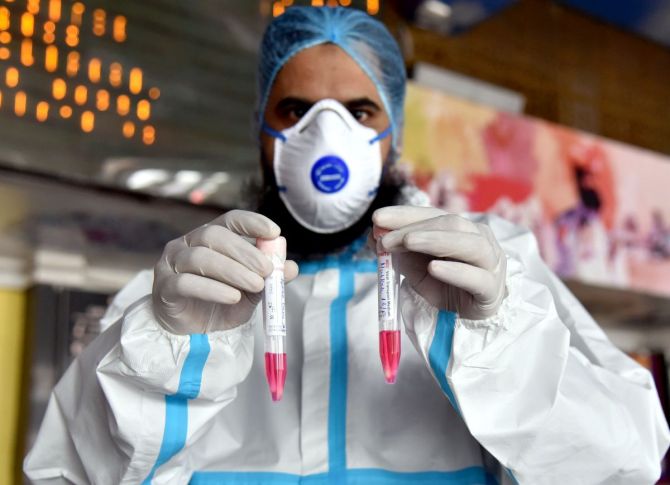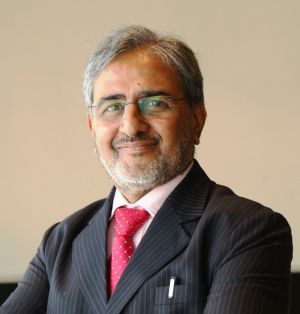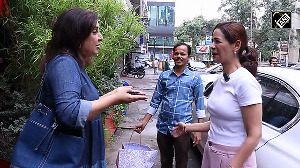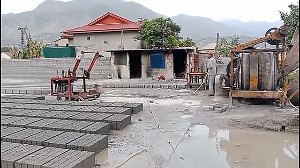'If at all there is going to be a second wave, it will not be very strong unlike in the US and Europe.'

"I feel the Covid situation is blown out of proportion," Dr Ishwar Gilada, an expert on HIV care and infectious diseases, tells Shobha Warrier/Rediff.com in the concluding segment of a two-part interview.
The other day, a former scientist and vice president of Pfizer said the pandemic was over and the vaccination race had to stop.
According to him, even the scientists in the UK ignored immunological memory against respiratory diseases as 30% of the population already had prior immunity to the coronavirus.
How do you react to this viewpoint?
As a clinician and a practising doctor, what I have noticed in the last two months is that the virulence and infectivity of the coronavirus has come down. The number of patients requiring ICU and ventilator has come down drastically.
Another thing I have noticed is that if an infected person was infecting a lot many people earlier, in the last couple of months it also has come down.
Though there is not much change in the behaviour of the people, the number of infections is stagnant in some places or going down in most places.
Is it because the virus has become less virulent?
Yes. Many scientists have said that for a virus or a bacterium to survive, it needs a host. If they killed many people, that would be their own end too. So, for their own survival, they need to get weaker so that they can survive for a longer period.
Is it because people are developing immunity against the virus, or the virus is mutating and getting weaker?
Both. The virulence of the virus is down as it is getting weaker. People are also developing immunity.
There is another reason, too. For example, we do antibody test on the patients who come to our clinic in Mumbai for follow-up for HIV, STD, etc, and not Covid.
There are two different types of antibodies that can be detected on Covid Rapid Antibody Test kits: IgM antibodies come when the Covid infection is still active, they are usually seen from the seventh day of Covid infection to 28 days after the infection.
Detection of IgG antibodies shows past infection with the coronavirus. They start usually on the 14th day of infection and last for several months.
In July-August, we found 10% of them were Covid antibody positive, and in September 24% of our patients were positive, in October 36% of them tested positive; where as in November, we saw that 45% of them were positive, in a sample size of 100-125 per month.
We also found that 85% of the people who came to our clinic did not even remember that they had any signs or symptoms relating to Covid-19.
On probing further post-results, only 8% remembered having some mild symptoms like fever, cough or sore-throat for a day or two, whereas 7% either had Covid or someone in the family had Covid infection. They were not sick at all; they came for other follow-ups and we did the antibody test.
Out of our patients, 80% of them were from Mumbai and 20% from outside. Usually we get 60% of our patients from outside Mumbai and Maharashtra. Because travel has not started, 80% of our patients are from Mumbai itself. And they are adults from all sections of society; male, female, all age groups, from professionals to daily wage earners.
And if 45% of them are antibody positive, the vulnerable population remaining to get infected is only 55%.
So, I feel if at all there is going to be a second wave, it will not be very strong unlike in the US and Europe.
Are we developing herd immunity in India unlike in the US?&
 In some places, yes, particularly in the areas where there were a very large number of cases like in Maharashtra, Karnataka, Tamil Nadu, Andhra and Telangana. In some pockets in these states, people are developing herd immunity.
In some places, yes, particularly in the areas where there were a very large number of cases like in Maharashtra, Karnataka, Tamil Nadu, Andhra and Telangana. In some pockets in these states, people are developing herd immunity.
In this case, is vaccination the only way we can stop the virus, or should we let the population develop herd immunity over a period of time?
Immunity either through vaccine or through real infection ends up developing antibodies. People who get infection knowingly or unknowingly, whether they are symptomatic or asymptomatic, they develop antibodies. That is how our body develops its own protection.
If you don't get the infection, we give the vaccine so that the body can develop antibodies. So, both are fine.
Ultimately, you have to develop the antibodies, either through an infection or through the vaccine.
Unlike the HIV virus, this is a stable virus, and that is the reason why we could develop a Covid vaccine.
Stable virus means?
The Covid virus does not change its antigenicity so much unlike the HIV virus which has two different types (HIV 1 and HIV 2) and 4-5 different sub-types (A, B, C, D, E) and several sub-sub types (such as A-1, A-2 and so on). And that is the reason why we are not able to develop a vaccine for HIV even after more than three decades.
Would you say it is better to get vaccinated against the Covid virus if you are not infected otherwise?
When we were children, our parents used to say it is better to get chickenpox or measles once as you will be immune for life.
Today, there are chickenpox and measles vaccines, and we don't let today's children get infected so that they develop immunity. We do not want to take a chance now as a vaccine is available.
In the case of COVID-19,he death rate in India is very low at 1.5% of those detected as COVID-19 infections and out of this 1.5%, two-thirds die due to co-morbidities. So, the actual death rate is only 0.5%.
Taking into consideration the asymptomatic cases, the death rate could be just 0.05% which is very, very low. So, I feel the Covid situation is blown out of proportion.
What is needed is a multi-pronged approach. While the vaccine is necessary for the vulnerable and those with co-morbidities, others can manage with SMS -- sanitising, mask and social distancing.
Though the mortality rate is quite low in India, in the developed countries where the aged population is more, it is quite high.
Compared to India, the average age of the population in the developed countries is 10-20 years more.
And the majority of the death is happening in the old age homes there.
So, if you separate the deaths in the old age homes, it is almost as same as in India.











